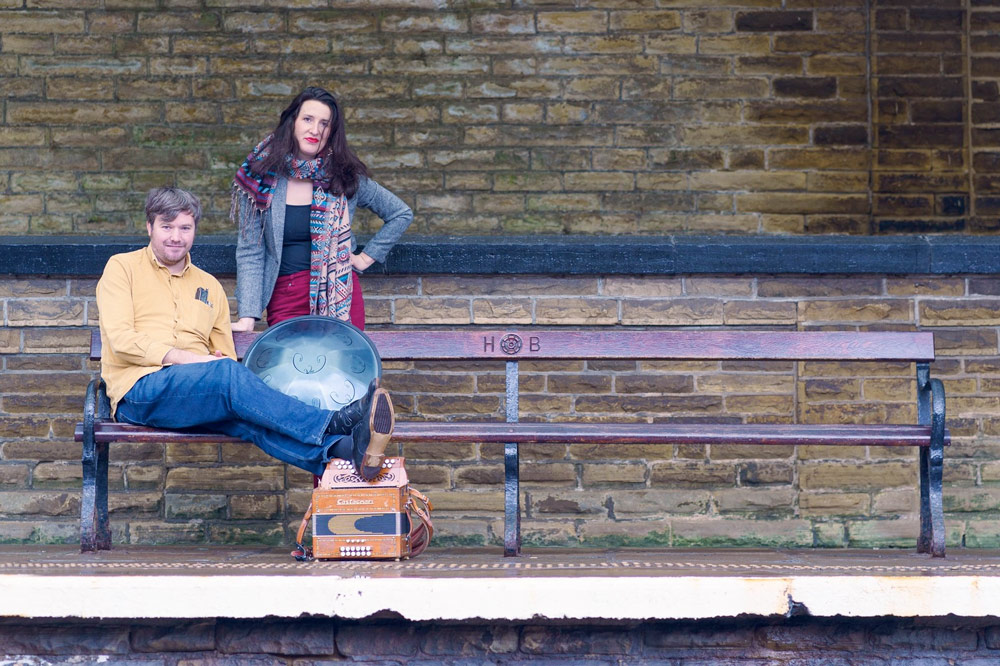STEVENS & POUND ASCENDING - Stoller Hall, Manchester
No surprises for what caught this folkie’s eye on the venue’s posters opposite Victoria Station. Will Pound is a man in demand around the folk circuit, anchoring the rhythm for dancers’ feet as the melodeon player in a ceilidh band, or as the go-to harmonica player for the likes of Martin Simpson. On my way to the gig, my mind cast around over all the collaborations I had witnessed: Dan Walsh, Eddy Jay, Jenn Butterworth, Tim Edey, not to mention the choice bands assembled for Will’s own various projects such as the wistful yet celebratory (and thoroughly magnificent) A Day Will Come. But tonight, the collaboration is with classical percussionist, Delia Stevens, and indeed we are told that this will be an evening of classical and folk music.
So, Will’s folk pedigree is undoubted, but the venue comes with its own track record too, despite only having been with us since 2017. Stoller Hall, while it is attached to Chetham’s School, hosts a wide variety of choice performances and is adventurous in its programming. That Simpson fellah again, he’s been here; so have The Young ‘Uns and Le Vent du Nord. It’s no wonder; the acoustics are superb and the ambience is as right for a folk gig as a classical performance. There’s a variety of spaces to suit the show; tonight’s was in the Carole Nash Hall, the more intimate of the two main halls.
Visually, Will is before us, two melodeons and a compact array of harmonicas to hand. On the other hand, Delia is dwarfed and surrounded by a great assortment of percussion to strike, strum, shake and, quite frequently, bow. The toy piano to which she often returns gives confirmation above all that this project has been fun – creative fun. They seem undaunted by what they’ve taken on, opening, as you will have anticipated, with their take on The Lark Ascending. Before you get any ideas that this will be a faithful rendition, Delia introduces some spoken word, and we now know that this is going to be a voyage of discovery, or maybe rediscovery. And that sets the scene, for this unlikely collection of instruments is not likely to recreate a full orchestra, so instead it is more like music inspired by the classics; variations on a theme, if you like.
Will confesses that the harmonica is not an obvious instrument for the classical genre, but looking at his latest musical explorations on his website, it may be that he plans to change that. Also, he approaches the music very much from the angle of the traditional player, learning by listening. He doesn’t read music, so Delia would send him sound files, which his ear would digest and absorb. Together they would then take the music on a journey, quite often a flight of fancy.
The heart of the show is their interpretations of a number of Holst’s Planets. By their own admission, their own versions somehow end up quite a bit longer than the original. Delia is dynamic as she roves between her instruments. It is, literally, a spectacular show. At times it is reminiscent of those two musicians who leapt round the stage recreating Tubular Bells. For the most part, on this occasion Will uses his melodeons only for drones. He doesn’t have to be quite as athletic as Delia, with everything close at hand, but he is dextrous, shifting quickly between harmonicas. He tells us that in a typical trad gig, he might use eight harmonicas, but he needs that many in Jupiter alone – these classical composers with their key changes! But being audience in an intimate venue, what is so apparent is how Will is totally in command of his gift. He introduces subtleties, blue notes, expressiveness to his harmonica that are quite uncommon. He really is taking the instrument to another level.
The inclusion of Sir Henry Wood’s Sailor’s Hornpipe, a stalwart from The Proms, makes clear the integrity of the set that has been put together. What pulls together Wood, Vaughan Williams and Holst is, of course, the inspiration they drew from traditional song and that really shines through in the evening’s performance. Maybe it is their method of work, with Will learning the tunes by ear, that means, for all the grand orchestrations, the folk roots are brought back to the fore.
So where will Stevens Pound go next? Well, they’ve still got the outer planets to play with! Brigg Fair would be a perfect fit within their setlist. Or will their adventurous minds takes us somewhere else altogether. Cheesy puns aside, when you’ve taken on The Planets, even the sky is not the limit.
Visit the Stevens & Pound Ascending Facebook page



